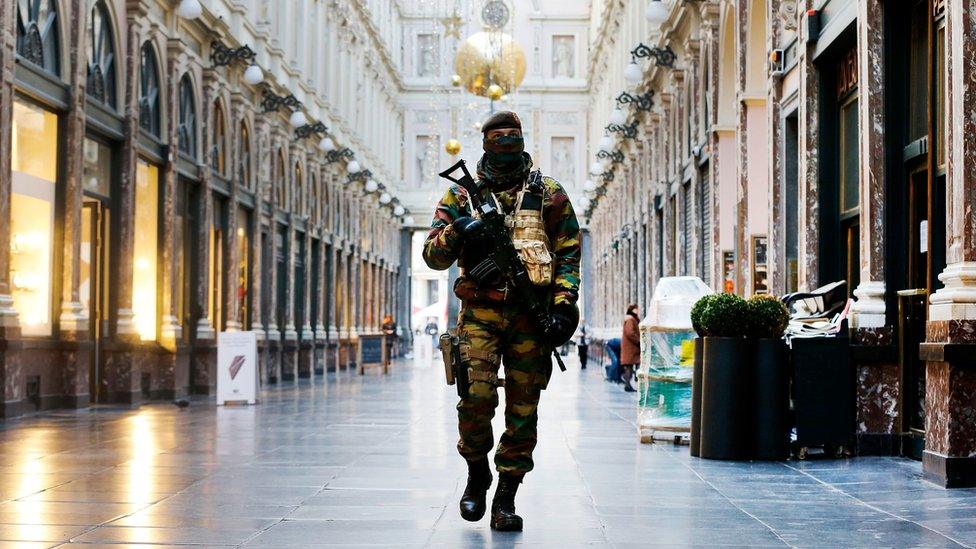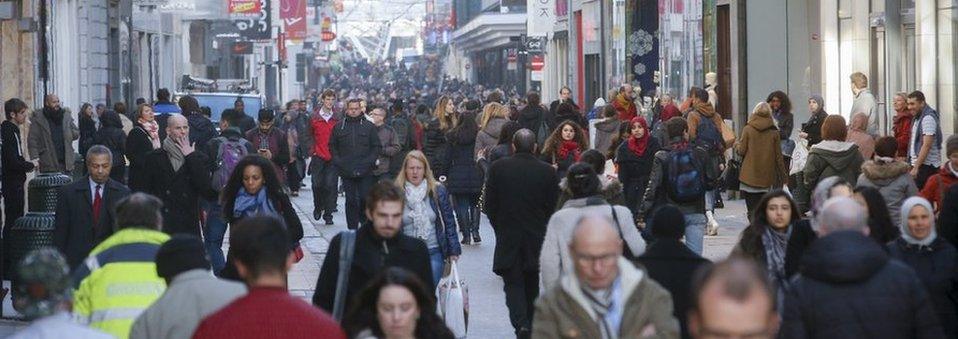Paris attacks: Brussels threat level reduced
- Published

Soldiers were deployed around Brussels while the city remained on its highest level of alert
The Belgian authorities have reduced the threat level in Brussels from its highest level of four to three.
The city was locked down for nearly a week, with schools, universities, and the metro system closed and soldiers deployed on the streets.
The alert was raised after fears of a Paris-style attack. Some of the Paris suspects lived in Brussels. At least one, Salah Abdeslam, is still at large.
130 people were killed in the Paris attacks and more than 360 wounded.
Police in Belgium have mounted a number of raids and searches over the past two weeks and have charged five people with terror-related offences.
Belgian Prime Minister Charles Michel stressed that the threat of an attack in Brussels remained "real" and "serious", but said the "imminent nature" of the threat was "no longer present".

After Paris: the fight against Islamic State
Belgian authorities reduce threat level in Brussels - alert downgraded after week of lockdown that saw schools closed and soldiers deployed
Russia prepares sanctions against Turkey - Russia to introduce wide-ranging economic sanctions after Turkey shot down Russian jet
Germany to deploy Tornado jets against IS - Angela Merkel pledges reconnaissance jets to help French air campaign against IS in Syria
Police in Berlin arrest two suspected Islamists - arrests made and mosque searched in the city's Charlottenburg district in response to an "actual threat"
Angela Merkel says Germany will "act quickly" - German chancellor tells Francois Hollande it is country's "duty" to support France's anti-IS fight

"We can confirm that the Threat Analysis Coordination Agency re-evaluated the threat level from four to level three," a spokesman for the Belgian crisis centre said.
The reduction to level three lowers the perceived threat from "serious and imminent" to "possible and likely", bringing Brussels in line with the rest of the country.
The lowering of the threat level came as a surprise, since the government had said that it would probably keep the highest threat level in the capital through the weekend.


From Brussels - BBC Europe Correspondent Chris Morris
Everyone is hoping that this is not the new normal, with armed police outside the school gates and soldiers in combat fatigues patrolling through shopping centres and railway stations.
The government says there is still a threat and it must be taken extremely seriously, but discontent with the way the situation has been handled is growing.
So there are many people still feeling a little nervous, in a city that is more accustomed to bureaucratic bungling than the threat of terrorism.

On Sunday night, Belgian police carried out a series of raids that the government said were linked to a possible imminent attack. No firearms or explosives were found, however, and 15 of 16 people detained were released on Monday.
On Thursday, fire crews and decontamination teams attended a major mosque in Brussels after a suspicious powder was discovered. The white powder turned out to be flour.

In Berlin, police arrested two suspected Islamists on Thursday after searching a mosque in the city.
The raid in the city's Charlottenburg district was aimed at investigating an "actual threat," police said.
German newspaper Bild reported that there were indications an attack was being planned at the mosque. Special forces in black uniforms were deployed during the operation and the building was sealed off.
